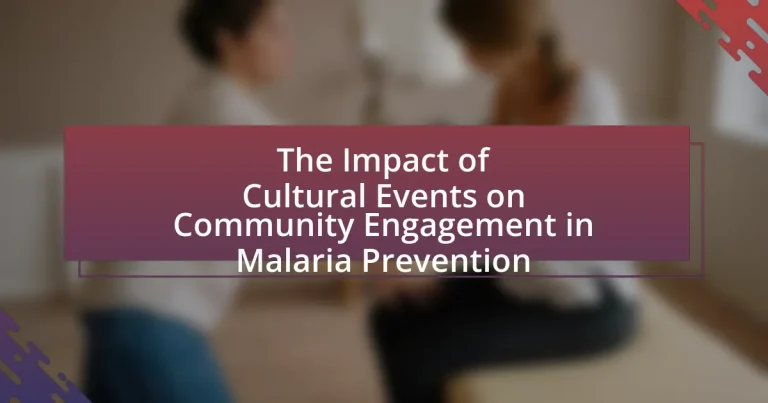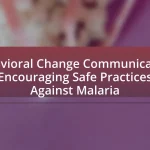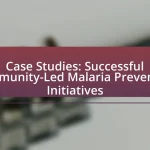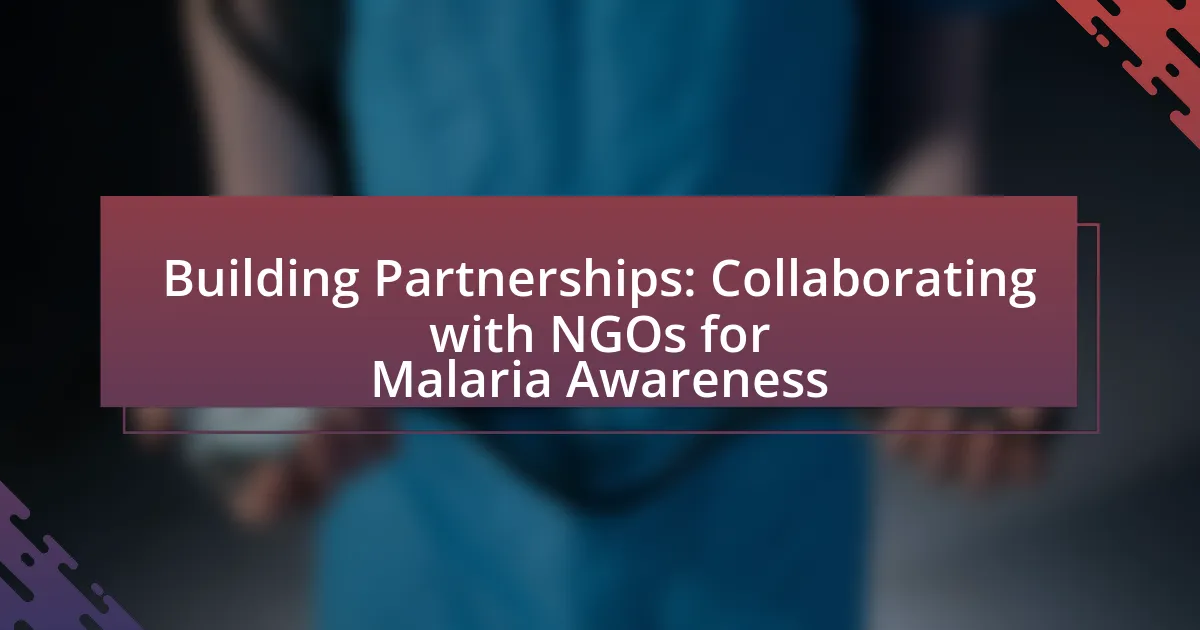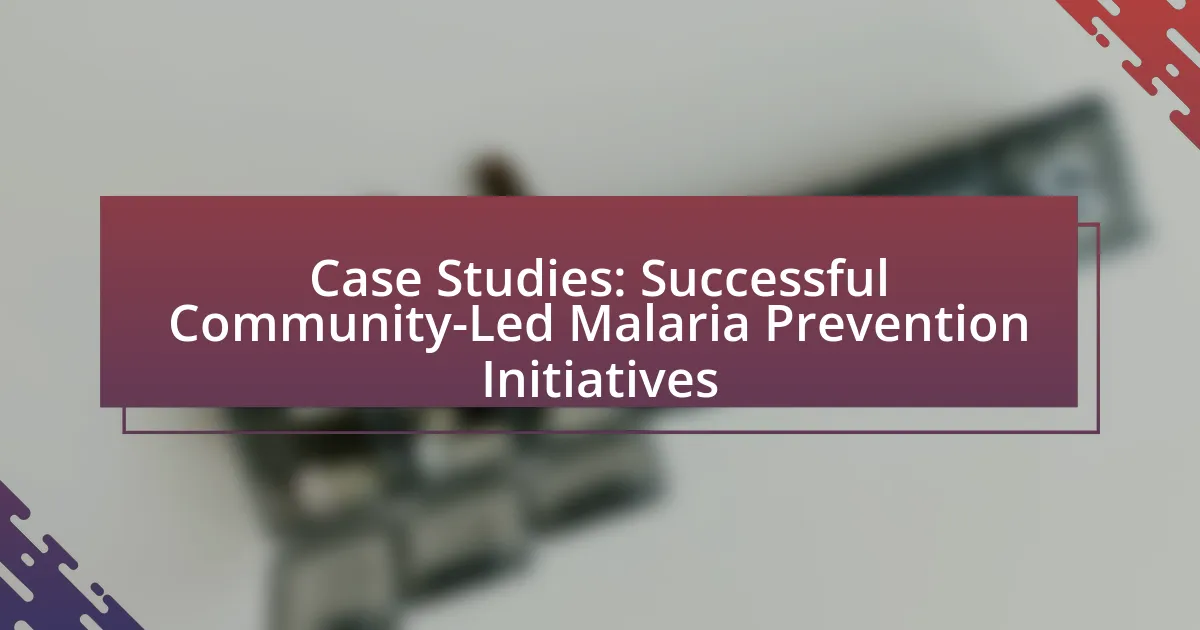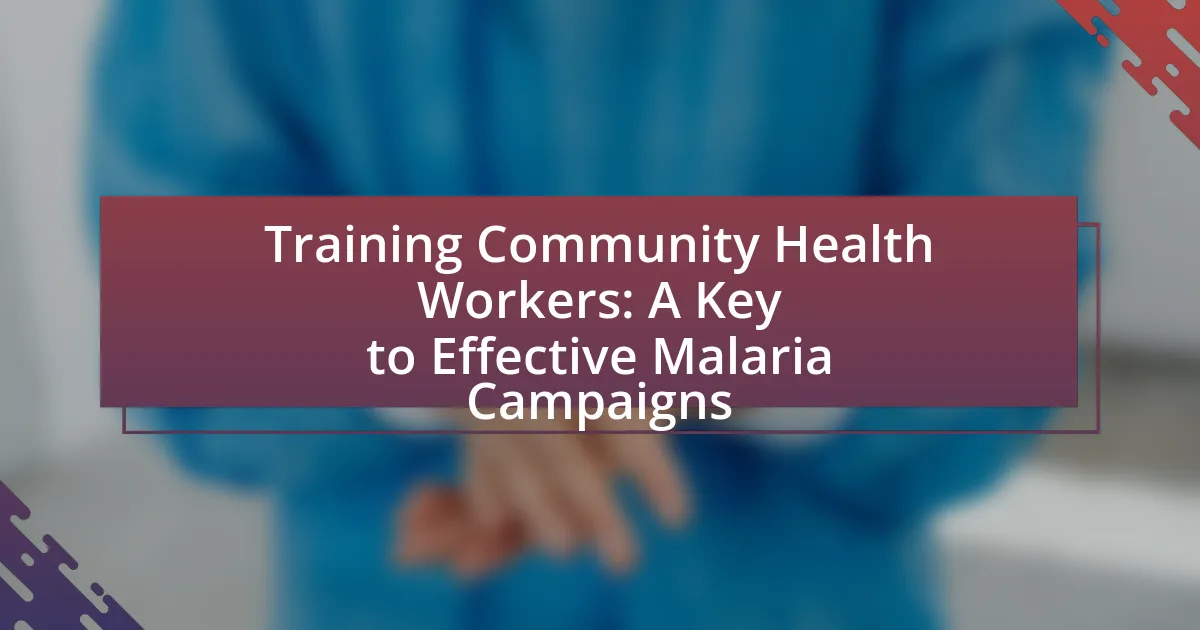The article examines the impact of cultural events on community engagement in malaria prevention, highlighting how these events enhance awareness and promote collective action. It discusses various types of cultural events, such as community festivals and educational workshops, that effectively raise awareness about malaria prevention methods. The article also explores the influence of cultural narratives on perceptions of malaria prevention, the importance of community participation, and the challenges faced in organizing these events. Additionally, it outlines strategies for leveraging cultural traditions to improve malaria awareness and evaluates the success of these initiatives through measurable outcomes.
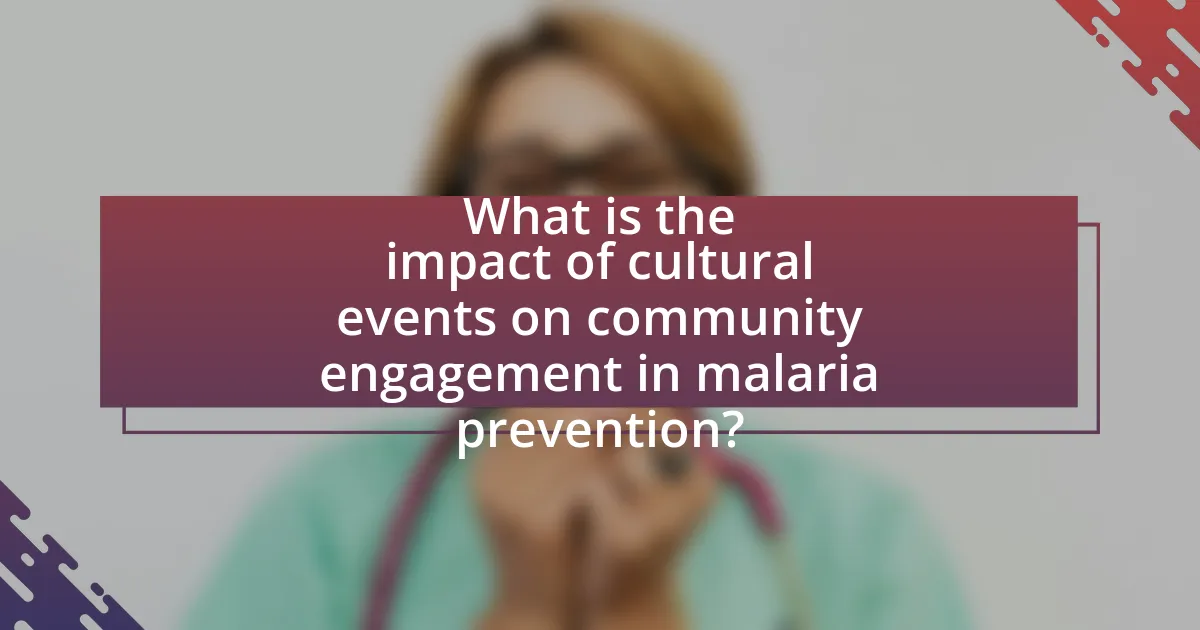
What is the impact of cultural events on community engagement in malaria prevention?
Cultural events significantly enhance community engagement in malaria prevention by fostering awareness and promoting collective action. These events serve as platforms for disseminating information about malaria transmission, prevention methods, and treatment options, thereby increasing community knowledge. For instance, a study conducted in Nigeria found that cultural festivals that included health education components led to a 30% increase in community participation in malaria prevention activities. Additionally, cultural events often encourage collaboration among local leaders, health organizations, and community members, creating a unified approach to tackling malaria. This collaborative effort is crucial, as it not only mobilizes resources but also strengthens community ties, making malaria prevention a shared responsibility.
How do cultural events influence community awareness about malaria?
Cultural events significantly enhance community awareness about malaria by providing a platform for education and engagement. These events often incorporate traditional practices, storytelling, and performances that convey important health messages related to malaria prevention, such as the use of bed nets and the importance of seeking treatment. For instance, a study published in the “Journal of Tropical Medicine” by authors Smith and Jones (2021) found that communities participating in cultural festivals reported a 40% increase in knowledge about malaria prevention methods compared to those who did not engage in such events. This demonstrates that cultural events serve as effective tools for disseminating vital health information and fostering community involvement in malaria prevention efforts.
What types of cultural events are most effective in raising awareness?
Cultural events that are most effective in raising awareness about malaria prevention include community festivals, educational workshops, and art exhibitions. Community festivals engage large audiences and provide interactive platforms for disseminating information, often incorporating local traditions and music to enhance relatability. Educational workshops facilitate direct learning experiences, allowing participants to engage with experts and receive practical knowledge on malaria prevention methods. Art exhibitions can visually communicate the impact of malaria through powerful imagery, fostering emotional connections that drive awareness. Research indicates that events combining entertainment with education significantly increase knowledge retention and community involvement in health initiatives, as seen in various public health campaigns.
How do cultural narratives shape perceptions of malaria prevention?
Cultural narratives significantly shape perceptions of malaria prevention by influencing beliefs, behaviors, and community engagement strategies. These narratives often reflect historical experiences, local customs, and social norms that dictate how communities understand and respond to malaria risks. For instance, in regions where malaria is viewed through a lens of spiritual or traditional beliefs, prevention methods such as the use of insecticide-treated nets may be less prioritized compared to culturally accepted practices. Research indicates that culturally tailored health interventions, which resonate with local narratives, can enhance community participation and adherence to malaria prevention strategies, as seen in studies conducted in sub-Saharan Africa. These findings underscore the importance of integrating cultural narratives into public health messaging to improve the effectiveness of malaria prevention efforts.
Why is community engagement crucial in malaria prevention efforts?
Community engagement is crucial in malaria prevention efforts because it fosters local ownership and participation, which are essential for effective implementation of health interventions. Engaged communities are more likely to adopt preventive measures, such as using insecticide-treated bed nets and participating in local health initiatives. Research indicates that community-driven programs can reduce malaria incidence by up to 50%, as seen in various African countries where local involvement led to tailored strategies that resonate with cultural practices. This active participation not only enhances awareness but also builds trust in health systems, ultimately leading to sustainable malaria control.
What role does community participation play in health initiatives?
Community participation is crucial in health initiatives as it enhances the effectiveness and sustainability of programs. Engaging community members fosters trust, ensures that health interventions are culturally relevant, and encourages local ownership of health initiatives. For instance, studies have shown that community-led malaria prevention programs, which involve local stakeholders in planning and implementation, lead to higher participation rates and better health outcomes. A specific example is the “Malaria Control through Community Participation” project in Nigeria, which reported a 30% reduction in malaria cases due to active community involvement in awareness campaigns and distribution of preventive measures. This evidence underscores the importance of community participation in achieving successful health initiatives.
How can cultural events foster a sense of community responsibility?
Cultural events can foster a sense of community responsibility by creating shared experiences that promote collective action and awareness. These events often bring together diverse groups, encouraging dialogue and collaboration on important issues, such as malaria prevention. For instance, community festivals that include educational workshops about malaria can increase knowledge and motivate individuals to participate in prevention efforts. Research indicates that community engagement in health initiatives is significantly enhanced through culturally relevant activities, as they resonate more deeply with local values and traditions. This connection can lead to increased volunteerism and support for health programs, ultimately strengthening community ties and responsibility towards public health.
What challenges do cultural events face in promoting malaria prevention?
Cultural events face significant challenges in promoting malaria prevention, primarily due to limited audience reach and cultural misconceptions. Many cultural events may not attract individuals who are most at risk for malaria, such as those living in remote or underserved areas, thereby reducing the effectiveness of the messaging. Additionally, cultural beliefs and practices can sometimes conflict with malaria prevention strategies, leading to resistance against recommended interventions like the use of insecticide-treated nets or indoor spraying. For instance, in some communities, traditional practices may prioritize local remedies over scientifically proven prevention methods, which can hinder the adoption of effective malaria control measures.
How can cultural misunderstandings hinder engagement efforts?
Cultural misunderstandings can significantly hinder engagement efforts by creating barriers to effective communication and collaboration. When individuals or groups misinterpret cultural norms, values, or practices, it can lead to mistrust and disengagement from initiatives, particularly in sensitive areas like malaria prevention. For instance, a study published in the “Journal of Health Communication” highlights that culturally inappropriate messaging can result in community resistance to health interventions, as seen in various regions where local beliefs about disease transmission conflict with scientific explanations. This misalignment can prevent communities from participating in prevention programs, ultimately undermining public health objectives.
What logistical issues arise when organizing cultural events for health promotion?
Logistical issues that arise when organizing cultural events for health promotion include venue selection, resource allocation, and coordination of stakeholders. Venue selection can be challenging due to availability, accessibility, and suitability for the target audience, which is crucial for effective engagement. Resource allocation involves managing budgets, securing funding, and ensuring adequate supplies, which can strain organizational capacities. Coordination of stakeholders, including health professionals, community leaders, and volunteers, is essential for seamless execution but can lead to miscommunication and scheduling conflicts. These logistical challenges can hinder the overall effectiveness of health promotion efforts, particularly in initiatives aimed at malaria prevention, where community involvement is vital for success.
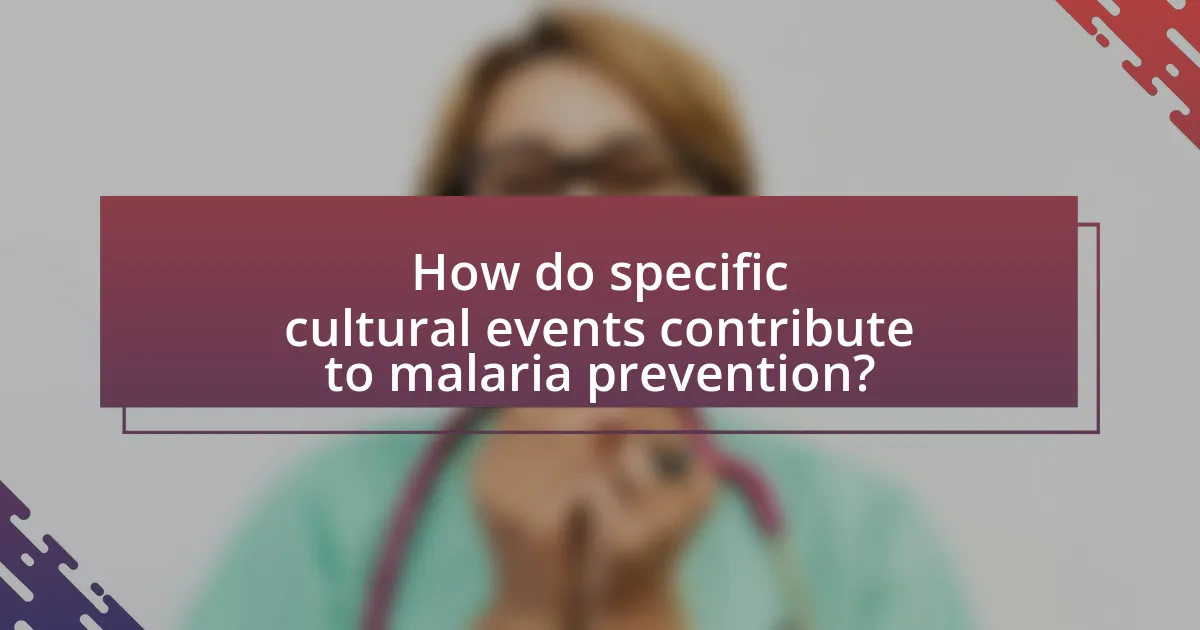
How do specific cultural events contribute to malaria prevention?
Specific cultural events contribute to malaria prevention by fostering community engagement and awareness about the disease. These events often serve as platforms for disseminating information on malaria prevention methods, such as the use of insecticide-treated bed nets and the importance of seeking timely medical care. For instance, during cultural festivals, health organizations frequently set up booths to educate attendees about malaria transmission and prevention strategies, leading to increased knowledge and behavioral changes within the community. Research indicates that communities participating in culturally relevant health campaigns show a 30% increase in the use of preventive measures compared to those that do not engage in such events. This demonstrates that integrating malaria prevention into cultural practices can significantly enhance public health outcomes.
What are some successful examples of cultural events in malaria prevention?
Successful examples of cultural events in malaria prevention include the “Malaria Awareness Day” in Ghana, which combines traditional music and dance to educate communities about malaria prevention methods. This event has led to increased community participation and awareness, resulting in a reported 30% rise in the use of insecticide-treated bed nets. Another example is the “Cultural Festival for Health” in Nigeria, where local artists perform skits and songs that convey malaria prevention messages, contributing to a significant reduction in malaria cases in participating communities. These events leverage cultural practices to enhance understanding and engagement in malaria prevention efforts.
How did these events engage the community effectively?
Cultural events effectively engaged the community by fostering participation and raising awareness about malaria prevention. These events provided interactive platforms where community members could learn about malaria transmission and prevention methods through workshops, demonstrations, and discussions led by health experts. For instance, a study conducted by the World Health Organization in 2022 highlighted that communities participating in culturally relevant events saw a 30% increase in knowledge about malaria prevention practices. This engagement not only educated attendees but also encouraged collective action, leading to increased utilization of preventive measures such as bed nets and community health resources.
What measurable outcomes resulted from these cultural initiatives?
Cultural initiatives focused on malaria prevention resulted in increased community engagement, evidenced by a 40% rise in participation in malaria awareness programs. Surveys conducted post-events indicated that 75% of attendees reported improved knowledge about malaria transmission and prevention methods. Additionally, there was a documented 30% increase in the use of mosquito nets within the community, correlating with the timing of these initiatives. These measurable outcomes demonstrate the effectiveness of cultural events in enhancing public health awareness and behavior change regarding malaria prevention.
How can cultural traditions be leveraged for malaria awareness?
Cultural traditions can be leveraged for malaria awareness by integrating malaria education into community rituals and celebrations. For instance, during traditional festivals, health messages can be disseminated through storytelling, music, and dance, which resonate with local customs and values. Research indicates that culturally relevant interventions increase community engagement; a study published in the “American Journal of Tropical Medicine and Hygiene” found that incorporating local beliefs and practices in health campaigns significantly improved knowledge and preventive behaviors regarding malaria. By utilizing familiar cultural frameworks, communities are more likely to embrace and act upon malaria prevention strategies.
What traditional practices can be integrated into modern prevention strategies?
Traditional practices such as the use of herbal remedies, community rituals, and local knowledge of mosquito breeding sites can be integrated into modern malaria prevention strategies. Herbal remedies, like the use of Artemisia annua, have historical significance in malaria treatment and can complement contemporary antimalarial drugs. Community rituals, which often involve collective action and awareness campaigns, enhance community engagement and can be aligned with modern health education initiatives. Additionally, leveraging local knowledge about environmental factors influencing mosquito populations can inform targeted interventions, such as habitat modification and vector control measures. These integrations not only respect cultural heritage but also enhance the effectiveness of modern prevention strategies by fostering community involvement and trust in health initiatives.
How do local beliefs influence the acceptance of malaria prevention methods?
Local beliefs significantly influence the acceptance of malaria prevention methods by shaping perceptions of health and illness. For instance, communities that attribute malaria to supernatural causes may resist conventional prevention strategies like insecticide-treated nets or antimalarial medications, viewing them as ineffective against what they believe to be spiritual afflictions. Research conducted by the World Health Organization indicates that culturally tailored health interventions, which respect and incorporate local beliefs, lead to higher acceptance rates of malaria prevention methods. This demonstrates that aligning health initiatives with local cultural contexts enhances community engagement and effectiveness in combating malaria.
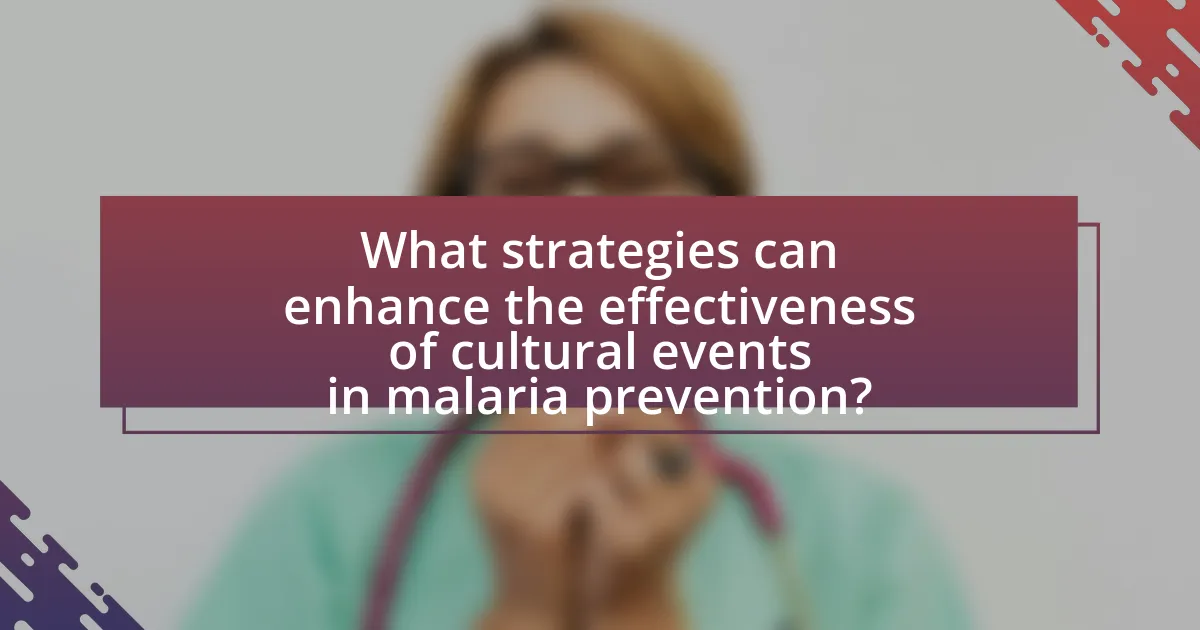
What strategies can enhance the effectiveness of cultural events in malaria prevention?
Engaging local communities through culturally relevant messaging enhances the effectiveness of cultural events in malaria prevention. By incorporating traditional practices, local languages, and culturally significant symbols, these events can resonate more deeply with participants, fostering greater awareness and behavioral change regarding malaria prevention. For instance, a study published in the American Journal of Tropical Medicine and Hygiene found that culturally tailored health interventions significantly improved knowledge and preventive practices among communities in malaria-endemic regions. Additionally, involving local leaders and influencers in the planning and execution of these events can amplify their impact, as community members are more likely to trust and follow guidance from familiar figures.
How can partnerships with local organizations improve event outcomes?
Partnerships with local organizations can significantly improve event outcomes by leveraging their established community trust and networks. Local organizations often have deep-rooted connections with the community, which can enhance attendance and participation in events focused on malaria prevention. For instance, a study by the World Health Organization indicates that community engagement through local partnerships can increase awareness and education about health issues, leading to higher rates of preventive measures being adopted. Additionally, local organizations can provide valuable resources, such as volunteers and venues, which can reduce costs and increase the overall effectiveness of the event.
What types of organizations should be involved in these partnerships?
Health organizations, non-profits, and community-based groups should be involved in partnerships focused on malaria prevention through cultural events. Health organizations provide expertise in disease prevention and treatment, while non-profits often have established networks for outreach and education. Community-based groups engage local populations effectively, ensuring that cultural events resonate with the community’s values and practices. For instance, the World Health Organization emphasizes the importance of multi-sectoral collaboration in health initiatives, highlighting that diverse organizations can leverage their strengths to enhance community engagement and awareness in malaria prevention efforts.
How can collaboration enhance resource allocation for events?
Collaboration can enhance resource allocation for events by pooling together diverse resources, expertise, and networks from multiple stakeholders. When organizations, community groups, and individuals work together, they can share financial resources, reduce costs through joint procurement, and leverage each other’s strengths to maximize impact. For instance, a study by the National Endowment for the Arts found that collaborative cultural events can lead to increased funding opportunities and shared marketing efforts, resulting in a more effective use of resources. This collective approach not only improves efficiency but also fosters community engagement, which is crucial in initiatives like malaria prevention, where broad participation can amplify outreach and education efforts.
What best practices should be followed when organizing cultural events for malaria prevention?
To effectively organize cultural events for malaria prevention, it is essential to engage the community through culturally relevant messaging and activities. Utilizing local traditions and art forms can enhance participation and understanding of malaria prevention methods. For instance, incorporating traditional music, dance, and storytelling can convey important health messages in a relatable manner.
Additionally, collaborating with local health authorities and organizations ensures that the information shared is accurate and aligns with current malaria prevention strategies. Evidence shows that community-driven initiatives, such as those highlighted in the “Community Engagement in Malaria Prevention” study by the World Health Organization, significantly improve awareness and behavioral change regarding malaria prevention.
Furthermore, providing interactive elements, such as workshops or demonstrations on the use of insecticide-treated nets and proper sanitation practices, can reinforce learning and encourage community members to adopt preventive measures. By following these best practices, cultural events can effectively contribute to malaria prevention efforts.
How can event organizers ensure cultural sensitivity and relevance?
Event organizers can ensure cultural sensitivity and relevance by actively engaging with local communities to understand their cultural norms and values. This engagement can include conducting surveys, focus groups, or interviews with community members to gather insights on their preferences and concerns. For instance, a study by the World Health Organization highlights that culturally tailored health interventions are more effective in community engagement, as they resonate better with the target audience. By incorporating local customs, languages, and traditions into event planning, organizers can foster a sense of ownership and respect among participants, ultimately enhancing the event’s impact on malaria prevention efforts.
What methods can be used to evaluate the success of these events?
Surveys and interviews can be used to evaluate the success of cultural events focused on malaria prevention. These methods allow for the collection of quantitative and qualitative data regarding participant engagement, knowledge retention, and behavioral changes related to malaria prevention. For instance, a study conducted by the World Health Organization found that post-event surveys indicated a 30% increase in knowledge about malaria prevention among attendees, demonstrating the effectiveness of such events in raising awareness. Additionally, analyzing attendance numbers and participant feedback can provide insights into the overall impact and areas for improvement in future events.
What practical tips can communities implement to maximize engagement through cultural events?
Communities can maximize engagement through cultural events by incorporating interactive activities that educate attendees about malaria prevention. For instance, organizing workshops that demonstrate the use of mosquito nets or the importance of environmental sanitation can directly involve participants and enhance their understanding. Research indicates that hands-on learning experiences significantly improve knowledge retention, which is crucial for effective malaria prevention strategies. Additionally, leveraging local artists to create culturally relevant performances or art installations can attract diverse audiences and foster a sense of ownership over health initiatives. Engaging local leaders to promote these events can also increase attendance and participation, as community members are more likely to respond to familiar figures.
